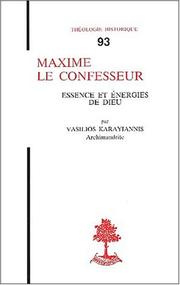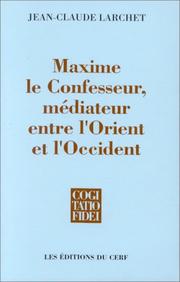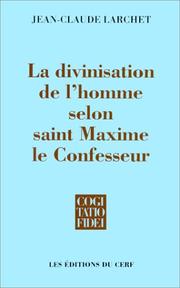| Listing 1 - 10 of 11 | << page >> |
Sort by
|
Book
ISBN: 0197262929 Year: 2003 Volume: 118 Publisher: Oxford New York Auckland Published for the British Academy by Oxford University Press
Abstract | Keywords | Export | Availability | Bookmark
 Loading...
Loading...Choose an application
- Reference Manager
- EndNote
- RefWorks (Direct export to RefWorks)
Prosopography. --- Prosopographie --- Rome --- Byzantine Empire --- Empire byzantin --- History --- Biography. --- History. --- Histoire --- Biographies --- Biographie --- Offprints --- Rome (Italy) --- Prosopography --- Methodology --- Byzantium (Empire) --- Vizantii︠a︡ --- Bajo Imperio --- Bizancjum --- Byzantinē Autokratoria --- Vyzantinon Kratos --- Vyzantinē Autokratoria --- Impero bizantino --- Bizantia --- Maximus Confessor --- Maximus --- Maxime le Confesseur --- Maximus der Bekenner --- Maximus the Confessor --- Massimo il Confessore --- Maksim Ispovednik --- Maksim Spoznavalec --- Maximos Homologetes --- Maxim Mărturisitorul --- Hagios Maximos, --- Maksim, --- Makʻsime Aġmsarebeli, --- Massimo Confessore, --- Massimo il Confessore, --- Maxim, --- Maxime le Confesseur, --- Maximos Confessor, --- Maximos, --- Maximos ho Gkraikos, --- Maximos ho Homologētēs, --- Maximus Confessor, --- Maximus, --- Maximus of Constantinople, --- Sfântul Maxim,

ISBN: 2701012724 2701017076 9782701012728 Year: 1993 Volume: 93 Publisher: Paris: Beauchesne,
Abstract | Keywords | Export | Availability | Bookmark
 Loading...
Loading...Choose an application
- Reference Manager
- EndNote
- RefWorks (Direct export to RefWorks)
God --- Dieu --- Attributes. --- History of doctrines --- Attributs --- Histoire des doctrines --- Maximus, --- God (Christianity) --- 276 =75 MAXIMUS CONFESSOR --- -#GROL:SEMI-276-05 Maxi --- Metaphysics --- Misotheism --- Monotheism --- Religion --- Theism --- Griekse patrologie--MAXIMUS CONFESSOR --- -Maximus Confessor, Saint --- -Contributions in concept of God --- #GROL:SEMI-276-05 Maxi --- Hagios Maximos, --- Maksim, --- Makʻsime Aġmsarebeli, --- Massimo Confessore, --- Massimo il Confessore, --- Maxim, --- Maxime le Confesseur, --- Maximos Confessor, --- Maximos, --- Maximos ho Gkraikos, --- Maximos ho Homologētēs, --- Maximus Confessor, --- Maximus of Constantinople, --- Sfântul Maxim, --- Maximus Confessor --- Maximus --- Maxime le Confesseur --- Maximus der Bekenner --- Maximus the Confessor --- Massimo il Confessore --- Maksim Ispovednik --- Maksim Spoznavalec --- Maximos Homologetes --- Maxim Mărturisitorul --- God (Christianity) - History of doctrines - Early church, ca. 30-600.
Book
ISBN: 9048541891 9789048541898 9789462989337 9462989338 Year: 2019 Publisher: Amsterdam : Amsterdam University Press,
Abstract | Keywords | Export | Availability | Bookmark
 Loading...
Loading...Choose an application
- Reference Manager
- EndNote
- RefWorks (Direct export to RefWorks)
The author's investigation of early-modern Javanese law reveals that judicial authority does not come from the contents of legal titles or juridical texts, but from legal maxims and variations thereof. A century and a half ago Simon Keyzer, a recognized scholar of Javanese law, noted that understanding of that law is dependent upon a grasp of such pithy expressions, which provide the key to the whole body of suits. (*Preface*, C.F. Winter, *Javaansche Zamenspraken*, 1858, which examines hundreds of *sloka*, the majority of which are directed to prevailing legal practice).Drawing upon the contents of 18th century Javanese legal texts, the present work builds upon Keyzer's and Winter's references to '*sloka*-phenomena', namely *sloka* proper (maxims) and its derivatives *sinalokan* (that made of *sloka*), *aksara* here meaning legal principles, and *prakara* (matter, case). These are usually conveyed in vignettes illustrating their function and as a group, constitute the essence of traditional Javanese written law.
Law --- Acts, Legislative --- Enactments, Legislative --- Laws (Statutes) --- Legislative acts --- Legislative enactments --- Jurisprudence --- Legislation --- Legal maxims --- Legal proverbs --- Maxims, Legal --- Proverbs, Legal --- Maxims --- Law, Javanese, written legal traditions, sloka (maxim/proverb).

ISSN: 05876036 ISBN: 2204059498 9782204059497 Year: 1998 Volume: 208 Publisher: Paris: Cerf,
Abstract | Keywords | Export | Availability | Bookmark
 Loading...
Loading...Choose an application
- Reference Manager
- EndNote
- RefWorks (Direct export to RefWorks)
Holy Spirit --- Sin, Original --- Papacy --- Saint-Esprit --- Péché originel --- Papauté --- Procession --- History of doctrines --- History --- Histoire des doctrines --- Histoire --- Maximus, --- 276 =75 MAXIMUS CONFESSOR --- -Papacy --- -Sin, Original --- -Depravity --- Original sin --- Fall of man --- Holy See --- See, Holy --- Popes --- Holy Ghost --- Paraclete --- Pneumatology (Theology) --- Spirit, Holy --- God (Christianity) --- Theology, Doctrinal --- Spirit --- Trinity --- Griekse patrologie--MAXIMUS CONFESSOR --- -History of doctrines --- Maximus Confessor, Saint --- -Griekse patrologie--MAXIMUS CONFESSOR --- Péché originel --- Papauté --- Procession&delete& --- Hagios Maximos, --- Maksim, --- Makʻsime Aġmsarebeli, --- Massimo Confessore, --- Massimo il Confessore, --- Maxim, --- Maxime le Confesseur, --- Maximos Confessor, --- Maximos, --- Maximos ho Gkraikos, --- Maximos ho Homologētēs, --- Maximus Confessor, --- Maximus of Constantinople, --- Sfântul Maxim, --- Maximus Confessor --- Maximus --- Maxime le Confesseur --- Maximus der Bekenner --- Maximus the Confessor --- Massimo il Confessore --- Maksim Ispovednik --- Maksim Spoznavalec --- Maximos Homologetes --- Maxim Mărturisitorul --- Holy Spirit - Procession - History of doctrines --- Sin, Original - History of doctrines --- Papacy - History of doctrines --- Maximus, - Confessor, Saint, - approximately 580-662

ISBN: 2204052493 9782204052498 Year: 1996 Volume: 194 Publisher: Paris: Cerf,
Abstract | Keywords | Export | Availability | Bookmark
 Loading...
Loading...Choose an application
- Reference Manager
- EndNote
- RefWorks (Direct export to RefWorks)
Deification (Christianity) --- History of doctrines --- 276 =75 MAXIMUS CONFESSOR --- -#GGSB: Griekse patrologie (studie) --- Theosis (Christianity) --- Salvation --- Griekse patrologie--MAXIMUS CONFESSOR --- -Christianity --- Maximus Confessor, Saint --- -Contributions in doctrine of deification --- -Maximus Confessor, Saint --- #GGSB: Griekse patrologie (studie) --- Christianity --- Maximus, --- Hagios Maximos, --- Maksim, --- Makʻsime Aġmsarebeli, --- Massimo Confessore, --- Massimo il Confessore, --- Maxim, --- Maxime le Confesseur, --- Maximos Confessor, --- Maximos, --- Maximos ho Gkraikos, --- Maximos ho Homologētēs, --- Maximus Confessor, --- Maximus of Constantinople, --- Sfântul Maxim, --- Maximus Confessor --- Maximus --- Maxime le Confesseur --- Maximus der Bekenner --- Maximus the Confessor --- Massimo il Confessore --- Maksim Ispovednik --- Maksim Spoznavalec --- Maximos Homologetes --- Maxim Mărturisitorul --- Griekse patrologie (studie) --- Deification (Christianity) - History of doctrines - Middle Ages, 600-1500. --- MAXIME LE CONFESSEUR (SAINT) (580-662) --- SPIRITUALITE ORIENTALE --- CHRISTIANISME --- THEOLOGIE --- 06E-07E SIECLES --- ORIENT --- HISTOIRE --- 5E-7E SIECLES
Book
ISBN: 1787446735 9781787446731 9781640140455 164014045X Year: 2020 Publisher: Rochester, New York : Camden House,
Abstract | Keywords | Export | Availability | Bookmark
 Loading...
Loading...Choose an application
- Reference Manager
- EndNote
- RefWorks (Direct export to RefWorks)
With the disappearance of the eyewitness generation and the globalization of Holocaust memory, this book interrogates key concepts in Holocaust and trauma studies through an assessment of contemporary German-language Jewish authors.
German literature --- Holocaust, Jewish (1939-1945), in literature. --- Jewish authors --- History and criticism. --- Aesthetics. --- Benjamin Stein. --- Contemporary German-Language Jewish Literature. --- Cultural Studies. --- Ethics. --- Eva Menasse. --- Eyewitness Generation. --- Globalization. --- Holocaust Representation. --- Holocaust. --- Hyper-Mediation. --- Literary Studies. --- Maxim Biller. --- Media. --- Memory. --- Nazi Past. --- Renegotiating Postmemory. --- Transgenerational Memory. --- Transnational Memory. --- Vladmir Vertlib.
Book
ISBN: 0900362987 Year: 1977 Publisher: London Europa Publications
Abstract | Keywords | Export | Availability | Bookmark
 Loading...
Loading...Choose an application
- Reference Manager
- EndNote
- RefWorks (Direct export to RefWorks)
History of the United Kingdom and Ireland --- anno 1800-1999 --- #BUAR:bibl.de Bock --- Businesspeople --- Weapons industry --- Arms industry --- Military weapons industry --- Munitions --- Munitions industry --- Defense industries --- Biography --- Vickers, Albert, --- Vickers, Thomas Edward, --- Vickers, T. E., --- Vickers Limited. --- Vickers Limited --- Vickers plc --- Vickers Group --- Vickers Group of Companies --- Vickers, Sons & Maxim (Firm) --- Vickers (Firm : Great Britain) --- Grande-bretagne --- Conditions economiques --- Biographies --- Armements et industries d'armement --- 19e-20e siecles --- Industrie et commerce
Book
ISBN: 994932856X 9949328152 9789949328567 Year: 2015 Publisher: Tartu University of Tartu Press
Abstract | Keywords | Export | Availability | Bookmark
 Loading...
Loading...Choose an application
- Reference Manager
- EndNote
- RefWorks (Direct export to RefWorks)
Studies in Syntactics. The purpose of this book is to explore the structure of the text as such using a metalanguage derived from quantitative poetics. Grigori Utgof’s thesis is that texts should be studied statistically. The main problems addressed in his research are the problem of successivity on the formal (syntactic) plane of artistic texts, and the problem of syntactic dissimilarity. Largely prompted by Yuri Tynianov’s famous statement – „The unity of the work is not a closed, symmetrical intactness, but an unfolding, dynamic integrity. Between its elements is not the static sign of equality and addition, but the dynamic sign of correlation and integration. The form of the literary work must be recognized as a dynamic phenomenon“ (The Problem of Verse Language; translated by Michael Sosa and Brent Harvey) – Grigori Utgof demonstrates the inherent nonidentity of the intratextual order, and proceeds to the problem of measuring some translated texts’ dissimilarities. In particular, his book is an inquiry into the structure of the following eight texts: Приглашение на казнь / Invitation to a Beheading by Vladimir Nabokov, and the novel’s Estonian translation Kutse tapalavale [Invitation to the Block] by Rein Saluri; “За гремучую доблесть грядущих веков...” by Osip Mandel’shtam, and two translations of this poem into English: “In the Name of the Higher Tribes of the Future” by Robert Lowell and “For the Sake of the Resonant Valor of Ages to Come…” by Vladimir Nabokov; “Облако в штанах” (“Cloud in Trousers”) by Vladimir Mayakovsky; “Ballada [Ballade]” by Czesław Miłosz in Natalya Gorbanevskaya’s translation (“Баллада”)
Grammar, Comparative and general --- Literature, Modern --- Translating and interpreting. --- Syntax. --- Interpretation and translation --- Interpreting and translating --- Language and languages --- Literature --- Translation and interpretation --- Translators --- Syntax --- Translating --- Linguistics --- Philology --- Grammar, Comparative and general Syntax --- Maxim Šapir --- Robert Lowell --- Vladimir Mayakovsky --- neostructuralism --- Vladimir Nabokov --- Mikhail Gasparov --- Yuri Tynianov --- Czesław Miłosz --- Natalya Gorbanevskaya --- 20th century literature --- Osip Mandel’shtam --- Rein Saluri --- Dmitri Nabokov --- Capital punishment --- Channel One Russia --- Decapitation --- Invitation to a Beheading --- Lucius Quinctius Cincinnatus --- The Day (Kiev) --- We (novel)
Book
ISBN: 1009297481 1009297511 100929749X 100929752X Year: 2023 Publisher: Cambridge : Cambridge University Press,
Abstract | Keywords | Export | Availability | Bookmark
 Loading...
Loading...Choose an application
- Reference Manager
- EndNote
- RefWorks (Direct export to RefWorks)
How did Britain's most prominent armaments firms, Armstrongs and Vickers, build their businesses and sell armaments in Britain and overseas from 1855 to 1955? Joanna Spear presents a comparative analysis of these firms and considers the relationships they built with the British Government and foreign states. She reveals how the firms developed and utilized independent domestic strategies and foreign policies against the backdrop of imperial expansion and the two world wars. Using extensive new research, this study examines the challenges the two firms faced in making domestic and international sales including the British Government's commitment to laissez faire policies, prejudices within the British elite against those in trade, and departmental resistance to dealing with private firms. It shows the suite of strategies and tactics that the firms developed to overcome these obstacles to selling arms at home and abroad and how they built enduring relationships with states in Latin America, Asia, and the Middle East.
Weapons industry --- International trade --- Arms transfers --- Imperialism --- History. --- Vickers (Firm : Great Britain) --- Arms sales --- Arms traffic --- Foreign military sales --- Military sales --- Munitions --- Sale of military equipment --- Arms race --- Defense industries --- Military assistance --- External trade --- Foreign commerce --- Foreign trade --- Global commerce --- Global trade --- Trade, International --- World trade --- Commerce --- International economic relations --- Non-traded goods --- Arms industry --- Military weapons industry --- Munitions industry --- Vickers Limited --- Vickers plc --- Vickers Group --- Vickers Group of Companies --- Vickers, Sons & Maxim (Firm)
Book
ISBN: 3653050464 3631657536 3653975743 Year: 2015 Publisher: Bern Peter Lang International Academic Publishing Group
Abstract | Keywords | Export | Availability | Bookmark
 Loading...
Loading...Choose an application
- Reference Manager
- EndNote
- RefWorks (Direct export to RefWorks)
Das Buch hat die Darstellung deutsch-jüdischer Identität in ausgewählten Prosatexten des zeitgenössischen, deutsch-jüdischen Autors Maxim Biller zum Thema. Seit 1989 ist jüdisches Leben in Deutschland «sichtbarer» und heterogener geworden. Das liegt maßgeblich an der veränderten Selbstrepräsentation vieler jüngerer Juden. In und mit seinen Texten Der gebrauchte Jude (2009), Esra (2003), Die Tochter (2000) und seinen Kurzgeschichten (1990/1994) bricht Maxim Biller – der kontroverseste Vertreter der sogenannten Zweiten Generation – mit den Tabus, die den Diskurs über deutsch-jüdische Identität nach wie vor bestimmen. Wie, warum und mit welchen Effekten er das macht, analysiert die Autorin mithilfe von Michel Foucaults Diskurstheorie und Judith Butlers Theorie der Performativität.
Biller, Maxim, --- Criticism and interpretation. --- Germany --- Germany. --- Ethnic relations --- In literature. --- Alemania --- Ashkenaz --- BRD --- Bu̇gd Naĭramdakh German Uls --- Bundesrepublik Deutschland --- Deutsches Reich --- Deutschland --- Doitsu --- Doitsu Renpō Kyōwakoku --- Federal Republic of Germany --- Federalʹna Respublika Nimechchyny --- FRN --- German Uls --- Germania --- Germanii︠a︡ --- Germanyah --- Gjermani --- Grossdeutsches Reich --- Jirmānīya --- KhBNGU --- Kholboony Bu̇gd Naĭramdakh German Uls --- Nimechchyna --- Repoblika Federalin'i Alemana --- República de Alemania --- República Federal de Alemania --- Republika Federal Alemmana --- Vācijā --- Veĭmarskai︠a︡ Respublika --- Weimar Republic --- Weimarer Republik --- Germany (East) --- Deguo --- 德国 --- Gėrman --- Герман Улс --- ХБНГУ --- Германия --- جرمانيا --- ドイツ --- ドイツ連邦共和国 --- ドイツ レンポウ キョウワコク --- Germany (Territory under Allied occupation, 1945-1955) --- Germany (Territory under Allied occupation, 1945-1955 : British Zone) --- Germany (Territory under Allied occupation, 1945-1955 : French Zone) --- Germany (Territory under Allied occupation, 1945-1955 : Russian Zone) --- Germany (Territory under Allied occupation, 1945-1955 : U.S. Zone) --- Germany (West) --- Holy Roman Empire --- BuÌgd NaiÌramdakh German Uls --- Doitsu RenpoÌ KyoÌwakoku --- Federalʹna Respublika Nimechchyny --- GeÌrman --- Germaniiï¸ a︡ --- JirmaÌniÌya --- Kholboony BuÌgd NaiÌramdakh German Uls --- RepuÌblica de Alemania --- RepuÌblica Federal de Alemania --- VaÌcijaÌ --- VeiÌmarskaiï¸ a︡ Respublika --- Europe --- Literary studies: post-colonial literature --- Communication studies --- 21st century history: from c 2000 --- -Society & culture: general --- Billers --- Codrai --- Diaspora --- Diskurse --- Diskurstheorie --- Maxim --- Negative Symbiose --- Performativität --- Prosa --- Zweite Generation
| Listing 1 - 10 of 11 | << page >> |
Sort by
|

 Search
Search Feedback
Feedback About UniCat
About UniCat  Help
Help News
News